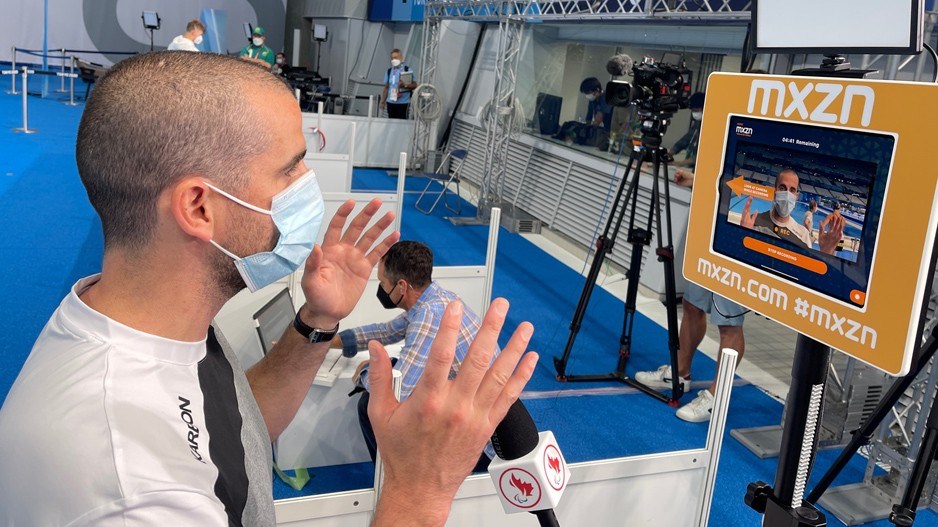While southern B.C. enjoyed some sun in the waning days of summer, Keith Wells’ free time was spent signing out of his Tokyo hotel, a guard eyeing him amid strict COVID-19 restrictions, for 15-minute walks each day.
“You can’t go to an izakaya [bar] or anything – everything is closed at eight o’clock,” said the sportscaster-turned-tech-entrepreneur, lamenting the city’s strange ghost-town vibe while attending this year’s Paralympic Games in Japan.
Instead, the exhilaration the CEO of MXZN Technology Inc. felt during his sixth visit to Tokyo came from travelling to venues to test out his Victoria startup’s new broadcasting technology on behalf of the Canadian Paralympic Committee (CPC).
“The one weird thing from a TV standpoint is that there’s a six-foot moat between you and the athletes,” said Wells.
“This has created some problems: a different routine for doing interviews, with mike stands where we would never use [them] before, and keeping your distance.”
Instead of conducting “moat” interviews, Canadian Paralympic athletes approached MXZN’s interview kiosks to offer their thoughts in front of shoulder-width stations that can be adjusted to stand slightly taller than the average person. Professional lighting, 4K cameras, a 5G-capable iPad and a mike pointed directly at interviewees were meant to create a mini-studio of sorts within the confines of Paralympic venues.
Martin Richard, the CPC’s executive director of communications, said the committee had to adapt significantly to keep athletes safe at the Games while also telling their stories.
The venture is not Wells’ first foray into the crossroads between sports and technology.
He founded STN Video Inc., one of Victoria’s most high-profile tech companies, after departing journalism in 2008.
STN is best known for its video distribution platform for sports highlights that are showcased within online stories for 1,800 publications, including the Los Angeles Times and the Chicago Tribune. So far, it has amassed a portfolio of more than one million videos and has garnered views of more than one billion in a single month.
Wells came up with the idea for MXZN while attending the 2012 Paralympics in London, where he noticed athletes walking through frequently empty “mixed zones” – a term used in Europe indicating where media interviews with athletes take place.
“It was a sad, sad thing when you think about it. An athlete having this great athletic moment, even if they’re ninth place or something, and no media from their countries there to talk to them,” he said. “It was a sound idea then, and [I] was just kind of prompted to get busy with it because of COVID.”
Six of the self-serve interview stations were deployed in Tokyo, and the CEO sees the potential for them to be used at more than just large sporting events.
Wells said he couldn’t provide a ballpark price for how much the kiosks would sell for because the company is exploring different business models, such as subscription services, for the devices that could also be used for corporate communications or at universities for news outlets seeking expert opinions.
“It’s about raising the visibility of minorities, women – these athletes. It’s not just the gold medallists as [it is] a seventh-place finisher, and athletes that are coming from countries that can’t afford to send media to international events,” he said.
“I could see that we would have a variety of these kiosks in a mixed-zone area where athletes come up, pick up their flag, and in their language, get the prompts when to deliver their pre/post general comments.” •




